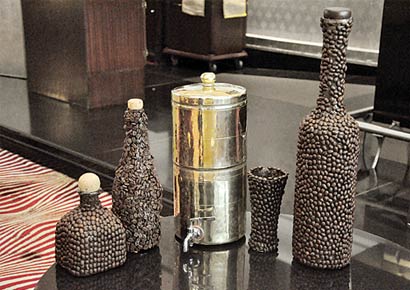Coonoor (Tamil Nadu):
The Tea Research Foundation (TRF) Saturday released for commercial production a new tea clone, which is superior in quality, has more leaves and can be harvested mechanically.
“The new clone, termed TRF-5, has high yield potential, can survive a dry spell and is suitable for mechanised harvesting,” TRF director P. Mohan Kumar told IANS here.
Developed after extensive trials and field testing in select estates, the TRF-5 is a hybrid product of biclonal progenies.
“TRF-5 is suited to replace the aged or diseased seeding populations and for the re-plantation scheme of the Tea Board under the special purpose tea fund (SPTF),” Kumar said after releasing the variety at the planters’ annual conference here.
As the research arm of the United Planters’ Association of South India (Upasi), the foundation has identified six compatible graft partners to develop new bushes from the TRF-5 clones.
“Of the five clones we have developed in the past two decades, the TRF-5 has the second highest average yield – 6,126 kg per hectare as against 7,797 kg by TRF-1, which was released in 2000 for commercial production,” Kumar asserted.
The foundation has started distributing the new clone cuttings to estates in Tamil Nadu and Kerala to raise the plants for plucking as Orthodox or CTC (crush, tear and curl) leaves.
“We are registering TRF-5 with the Tea Board as an accepted clone for new planting or re-planting by small growers as well as large estates,” Kumar pointed out.
The foundation plans to first sell about 500-1,000 cuttings of TRF-5 to each tea garden in the three southern states and ship them to north-east estates after a couple of years.
According to the Tea Board estimates, about 50 percent of the 120,181 hectares across south India will be undergoing re-plantation during the next 5-10 years once the old plants (bushes) cross 50 years.
“TRF-5 will be one of the many clones we have developed over the years for re-plantation and rejuvenation of old gardens. In the first cycle of three years, the new clone will yield 2,455 kg per hectare (ha), 4,535 kg/ha in fourth year and 7,225 kg/ha in fifth year,” TRF assistant director R. Victor Ilango said.
To protect the new clone’s intellectual property (IP), the foundation will soon file for patenting it with the regulatory authorities.
“We are waiting for the government to extend the Protection of Plant Varieties Act and Farmers Right Act to plantation crops so that we can file for registering the new clone,” Kumar observed.
The protection will also enable the foundation and nurseries to earn royalty on each cutting of TRF-5 clone.
source: http://www.twocircles.net / Home> India News / September 29th, 2012


